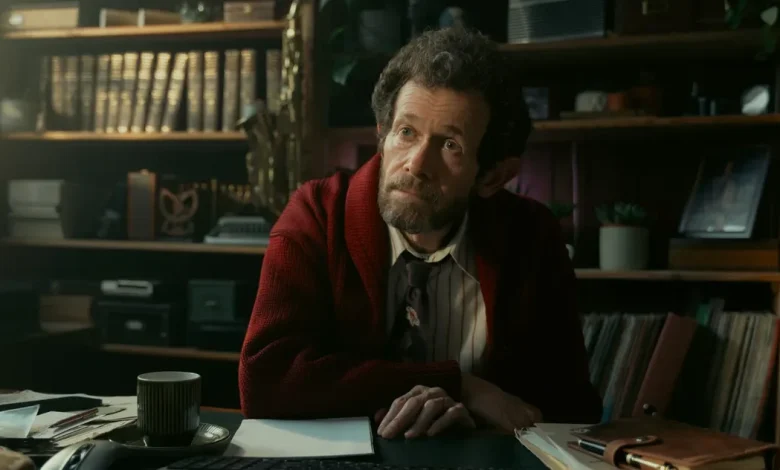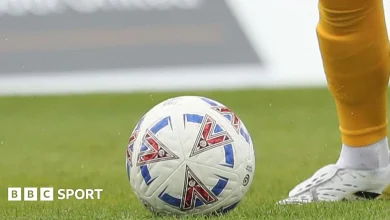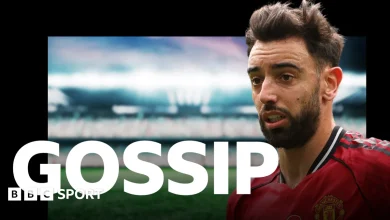‘Down Cemetery Road’ Series-Premiere Recap: Blow-up

In Mick Herron’s 2003 debut novel Down Cemetery Road, the first of his Zoë Boehm series, protagonist Sarah Trafford gets involved in a neighborhood mystery mainly because she is bored. At least, that’s how people around her see it — stuck in her picture-perfect house in Oxford with no career to speak of and her marriage slowly falling apart, she wants to feel useful. Morwenna Banks’s adaptation of the novel for Apple TV+, from the team behind Slow Horses (also adapted from Herron’s work), puts Sarah (Ruth Wilson) in the present and liberates her from domesticity: Sarah is an art restorer who can tell which paintings were done by the old masters and which by their forgotten wives based on their tone of blue.
Donning neck scarves, fuzzy sweaters, and Adidas sneakers, Sarah looks of a piece with her idyllic town. Biking home from work, she runs into a distracted little girl chasing a butterfly. Because she is a Working Woman preoccupied with Important Things, she has little talent for the domestic arts. She burns herself with her straightener and transfers a frozen lasagna from its cardboard container to a nice enamel baking dish and still manages to burn it. Sarah and her husband, Mark, are hosting some important prospective clients of his investment bank for dinner. Sarah, who would prefer to serve wine in funky, mismatched glasses rather than the “posh matching ones,” is snarky about her husband’s soulless job.
Intending to rile him up or not, she invites Rufus and Wigwam, her crunchiest “alternative community” friends, to join the party along with Paula and Gerard Inchon, whom Mark needs to impress. Gerard is arrogant and presumptuous; he’s surprised to hear Sarah has a job, then guesses she must be either in the charity sector or in “ethical publishing.” In the novel, he accuses Sarah of suffering from “bored housewife syndrome” and is nasty about the geopolitical crisis in the Middle East. Adapted for the current age, he rants against social-justice warriors and pokes fun at “disenfranchised youths with daddy issues.” In Banks’s satisfyingly rebalanced equation, Gerard loses some bite while Sarah gains some. He’s in the middle of declaring himself “Osama bin Business” when the house next door blows up.
The whole neighborhood watches as firefighters pull a little girl out of the rubble, whom Wigwam’s son Ziggy identifies as Dinah Singleton. Gerard learns from a police officer that her bed fell straight through the floor and under an open wardrobe, which shielded her from the debris. Rufus gathers from the firefighters that a gas main probably exploded while Mark captures, in his phone, the image of a man hovering by the accident, staring intently ahead like a ghost.
The image of Dinah being lifted into an ambulance sets our whole story in motion. From his old-fashioned, telephone-bearing, dusty-typewriter office, Joe Silvermann (Adam Godley), Private Eye, listens to news of the explosion on the radio. His wife and co-worker, Zoë Boehm (Emma Thompson), isn’t convinced that the explosion could be “a cash cow,” but Joe is keeping his ears wide open. In their dynamic, Zoë stands for practicality while Joe insists on whimsy: He speaks into a Dictaphone even though he’ll have to transcribe the report himself (they can’t afford a secretary).
Zoë mocks Joe’s notion that the explosion could be part of a bigger conspiracy, but the next thing we see are some men in suits in the Ministry of Defence building, shredding manila envelopes and talking in code. Hamza Malik, a bumbling Intelligence and Threats official, gets his ass handed to him by his superior, a steely, very tall man with a Bond-villain demeanor who all but steps on Malik’s neck. Malik really “bollocksed” this one — having carte blanche, his boss barks, doesn’t mean hiring “Wreck-It fucking Ralph” to “start a war in Oxford.” Malik’s job is now to make the whole thing go away — a task that will be complicated by Sarah’s increasing curiosity about what happened to Dinah.
From Wigwam, Sarah learns that Maddie Singleton, Dinah’s mother, was a widow and confirms a suspicion that Dinah was the butterfly-chasing, yellow-wellie-wearing little girl she ran into the day before. Ziggy wants to give his friend a card — Sorry your mum died — so Sarah offers to drop it off at the hospital on her way to work. But once there, she’s barred from seeing Dinah. The nurse in charge tells her that he can’t give out any information on their patients and doesn’t confirm or deny when Sarah asks if the girl is there. There are rules protecting hospital patients’ privacy, and the whole thing wouldn’t be so weird if the nurse weren’t so hostile. Sarah is asked to leave. Confused and irritated on her way out, she sees Gerard, who is also acting weird, even beyond his usual unpleasantness. He’s not particularly inclined to tell Sarah what he’s doing at the hospital, but he’s not shocked that it “can’t dish out info willy-nilly to every nosy neighbor.”
But something is definitely up. The same man Mark filmed with his phone at the scene of the accident follows Sarah through the hospital parking lot, then leaves in a van. When she gets to work, she notices that the picture accompanying a news report of the explosion online is altered from its print version: On the computer, Dinah has been erased. Using her restoration glasses, Sarah can see the vestiges of Dinah’s red blanket in the photo. By the time Sarah is on her way to the police department armed with evidence, we know she’s hit the point of no return. It only makes things worse that the police officers are being cryptic about the whole thing: One tells her that the “file has been flagged,” the other that there is “nothing on the system.” No one so much as offers to pass on the card to the orphaned, injured child, let alone allow Sarah to do it herself. What the hell is going on?
Deep-state shit is going on, that’s what. Malik is in even worse trouble after his boss finds out that there’s a lady sniffing around Dinah’s disappearance, despite Malik assuring him that the whole thing is “squared away.” When Malik asks what they’re to do with “the actual child,” his boss instructs him to move her (he doesn’t say where), but Malik protests that she’s not ready to leave intensive-care treatment for smoke inhalation yet. The eloquence with which his boss tells him what to do next is so delightfully British and villainous that it bears transcribing in full: “You will tell the chief medical officer to pull his finger out of his arsehole and sign her discharge summary, with his shitty finger if it speeds things up.” I was onboard with Down Cemetery Road from the moment a character named Wigwam was introduced, but this delivery won me over completely.
Meanwhile, out of the police department and into town, Sarah is being trailed by the man in the gray van. It’s sort of by accident that she happens into Oxford Investigations, Joe and Zoë’s office. Her first meeting with the two detectives is a celebration of genre archetypes: Each character embodies their role completely. There’s Sarah, the determined novice; there’s Zoë, the irreverent, acerbic detective; there’s Joe, the romantic who tries to impress Sarah by guessing things about her from looking at her hands. They mock each other: Joe is caught up in “private dick shit” while Zoë is like “Cruella out to hunt for puppies.” However focused on the action the show might be, in these moments, snippets of character shine through. Sarah immediately takes to the weaker party. She tells Joe everything: the news photos, the hospital, Gerard, the police, her belief that Dinah has been “deliberately erased.” When Joe asks what her connection to Dinah is, she admits in spite of herself that when she saw her on the day of the blast, Dinah reminded her of “the sort of child [she] used to be.”
Later, Zoë finds Joe getting ready to gather intel from the hospital nurses at the pub. She reminds him to focus on what can make them the money they need to pay off their water bill and mocks his methods — it’d be more efficient to start at the scene of the crime and talk to the victims. She won’t tell him where she’s going and blows him a kiss instead of giving him one. She’s hard on him and not very affectionate, but you still get the sense that there is real tenderness between them — that they would do anything for each other. If only Zoë knew that news of Sarah’s hiring Joe reaches Malik almost immediately, things might’ve turned out differently. Malik tells an aggressive-sounding man called Amos to “Get the child out of there before the target tries to play the hero,” emphasizing his point by slamming his hand right into his dinner.
Sarah sees the man in the gray van through her newly fixed window, which nearly knocks the wind out of her; by the time she recomposes, he’s no longer there. Downstairs, Mark tries to pitch Gerard something he doesn’t want to hear. He only stopped by to grab his coat and Paula’s scarf as well as to give Sarah a warning, not that she can be totally sure what he’s warning against. At first, when she asks if he has any news of Dinah — her voice barely a whisper, so Mark won’t hear her — it’s almost as if she thinks they could be allies in this whole thing. He tells her Dinah is in the ICU to finish treatment before being taken to the “relevant services.” When she tells him about the flagged file, he advises her to mind her own business. Besides, Mark needs help — and not with finding Gerard’s coat. “He’s out of his depth in shark-infested waters,” Gerard says, “and there are no rescue boats.”
Mark thinks Gerard is “going soft on the investment” and doesn’t want to hear from Sarah that dealing with Gerard and his type is not worth the money. As they’re having this conversation, Joe is learning from the nurses in the pub — after unadvisedly buying them all a round — that Dinah’s discharge summary has been signed, and that nurses have been told to pack her a bag. However, no one knows where she’s going or with whom, only that she is leaving tonight. Sarah heads straight to the hospital.
There, she sees the man in the van enter the hospital — for once, she’s the one trailing him. Sarah follows him to the intensive-care unit, but when they get there, the nurses bar Sarah from entering. In a panic that the man will reach Dinah before she does, Sarah activates the fire alarm. She looks for Dinah in the chaos of evacuation, but she is still inside being taken by a different man in a suit and an apprehensive-looking nurse. Sarah manages to just catch a glimpse of them as they hop into a car. The man in the gray van knocks her off her bicycle before she can follow Dinah’s car any further, not that it’d be easy to pedal that fast. When she sees Gerard Inchon near the site of chaos again, Sarah loses it. “Who do you work for, Gerard?” She demands furiously. “Where is the child?” But he tells her that the only child he knows anything of is the one Paula just miscarried — that’s why they were there earlier. Paula’s miserable expression in the front seat of the car only drives in Sarah’s blunder, and it’s not even the worst thing that will happen to her tonight. When she runs over to Joe’s office to tell him what happened, he is dead in his chair, his wrists slit, his hand holding a razor, jazz still playing on the speakers.
• In a mystery, most details are shown for a reason, so let us note that Sarah went to St. Magdala’s College at Oxford, Joe’s Oriel’s sister school, where the security guards still know her name. Also, Gerard left Paula’s scarf behind, and we know that Sarah is holding on to it because she wraps it around her shoulders later that night.
• What a relief to watch a prestige-television mystery show that uses a total of zero flashbacks. This pilot’s biggest strength is that it knows what it is — a detective story — and hits every note of the form, pitch perfect. The modernizing touch is light-handed, the characters compelling, and the dialogue a nod to the encrypted, wit-heavy pitter-patter of private eyes of yore. It’s not realistic dialogue; it’s hard-boiled, like all the best detective fiction is. Some lines, like the Wile E. Coyote comment, are lifted straight from the book, but Banks keeps up with Herron’s established rhythm.
• I thought this pilot did a pretty remarkable job setting up the facts of the case — missing child, explosion, government conspiracy, potential collusion with the private sector, private detectives — without getting bogged down with exposition. The rhythm is so propelling, not a minute goes wasted.
VULTURE NEWSLETTER
Keep up with all the drama of your favorite shows!
Vox Media, LLC Terms and Privacy Notice





